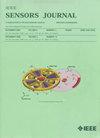用于高灵敏度葡萄糖检测的等离子体诱导透明超材料传感器
IF 4.3
2区 综合性期刊
Q1 ENGINEERING, ELECTRICAL & ELECTRONIC
引用次数: 0
摘要
在这项工作中,我们提出了一种基于等离子体诱导透明(PIT)的超材料用于葡萄糖溶液的检测。这种超材料的单细胞结构包括两个矩形条和一对在二氧化硅表面上制造的“拱桥”形结构。仿真结果表明,该生物传感器在1.71 THz和2.30 THz处表现出两个共振频率,高频共振灵敏度为471.43 GHz/RIU(折射率单位)。该传感器通过光刻技术制作完成,并通过商用太赫兹时域光谱仪(THz-TDS)验证了其性能。准备五种不同浓度的葡萄糖溶液进行测试。实验结果表明,该传感器在高频共振下的灵敏度为6.63 GHz/(mmol/L),检出限为0.0890 mmol/L。这表明传感器对葡萄糖溶液的高灵敏度。因此,这项研究提出了葡萄糖检测的潜在替代方案,对早期糖尿病监测具有重要意义。本文章由计算机程序翻译,如有差异,请以英文原文为准。
Plasmon-Induced Transparency-Based Metamaterial Sensor for Highly Sensitive Glucose Detection
In this work, we propose a metamaterial based on plasmon-induced transparency (PIT) for the detection of glucose solutions. The unit cell structure of this metamaterial comprises two rectangular strips and a pair of “arch-bridge” shaped structures fabricated on a silicon dioxide surface. Simulation results indicate that the biosensor exhibits two resonance frequencies at 1.71 and 2.30 THz, respectively, with a sensitivity of 471.43 GHz/RIU (refractive index unit) at the higher frequency resonance. The sensor fabrication is accomplished through photolithography and its performance is validated with a commercial terahertz time-domain spectrometer (THz-TDS). Glucose solutions of five different concentrations are prepared for testing. Experimental results demonstrate that at the higher frequency resonance, the sensor exhibits a sensitivity of 6.63 GHz/(mmol/L) and a limit of detection (LOD) of 0.0890 mmol/L. This indicates the sensor’s high sensitivity to glucose solutions. Hence, this study presents a potential alternative for glucose detection, with implications for early diabetes monitoring.
求助全文
通过发布文献求助,成功后即可免费获取论文全文。
去求助
来源期刊

IEEE Sensors Journal
工程技术-工程:电子与电气
CiteScore
7.70
自引率
14.00%
发文量
2058
审稿时长
5.2 months
期刊介绍:
The fields of interest of the IEEE Sensors Journal are the theory, design , fabrication, manufacturing and applications of devices for sensing and transducing physical, chemical and biological phenomena, with emphasis on the electronics and physics aspect of sensors and integrated sensors-actuators. IEEE Sensors Journal deals with the following:
-Sensor Phenomenology, Modelling, and Evaluation
-Sensor Materials, Processing, and Fabrication
-Chemical and Gas Sensors
-Microfluidics and Biosensors
-Optical Sensors
-Physical Sensors: Temperature, Mechanical, Magnetic, and others
-Acoustic and Ultrasonic Sensors
-Sensor Packaging
-Sensor Networks
-Sensor Applications
-Sensor Systems: Signals, Processing, and Interfaces
-Actuators and Sensor Power Systems
-Sensor Signal Processing for high precision and stability (amplification, filtering, linearization, modulation/demodulation) and under harsh conditions (EMC, radiation, humidity, temperature); energy consumption/harvesting
-Sensor Data Processing (soft computing with sensor data, e.g., pattern recognition, machine learning, evolutionary computation; sensor data fusion, processing of wave e.g., electromagnetic and acoustic; and non-wave, e.g., chemical, gravity, particle, thermal, radiative and non-radiative sensor data, detection, estimation and classification based on sensor data)
-Sensors in Industrial Practice
 求助内容:
求助内容: 应助结果提醒方式:
应助结果提醒方式:


